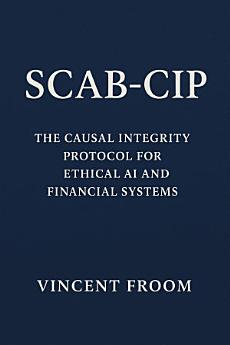SCAB-CIP: The Causal Integrity Protocol
About this ebook
At its core, SCAB-CIP confronts the problem of spurious correlations—patterns that appear predictive but collapse under stress, destabilizing markets, misdiagnosing patients, misidentifying threats, or spreading misinformation. Through a four-phase lifecycle—design-time blueprints, pre-deployment batteries, runtime guardrails, and post-incident forensics—Froom details how to detect, filter, and govern fragile reasoning before it becomes systemic risk.
Drawing from real-world case studies—flash crashes in high-frequency trading, false biomarkers in diagnostic AI, hallucinations in large language models—this book reframes the AI arms race: stability must take precedence over speed. By introducing tools such as the Causal Stability Index (CSI), Interventional Fragility Score (IFS), Causal Drift Index (CDI), and Herd Synchrony Coefficient (HSC), Froom provides both academics and practitioners with metrics to make causal governance auditable, enforceable, and globally standardized.
Accessible yet rigorous, this book is written for researchers, regulators, technologists, and policymakers who recognize that the next frontier of AI is not faster models, but causally grounded systems that align private incentives with public good.
SCAB-CIP is both a warning and a blueprint: a call to move from fragile, correlation-chasing AI toward a future of robust, ethical, and causally responsible intelligence.
About the author
Vincent Froom is a Vancouver-based researcher, author, and technologist whose work bridges artificial intelligence, ethics, and governance. He is the creator of the Synthetic Consciousness Assessment Battery (SCAB) and its companion framework, the Causal Integrity Protocol (SCAB-CIP), which together provide one of the first comprehensive approaches to evaluating both the behavior and the reasoning of artificial agents.
Froom’s scholarship spans theology, philosophy of mind, and machine ethics, but his most recent contributions focus on how causal governance can prevent systemic failures in finance, healthcare, defense, and generative AI. His writing combines rigorous analysis with a deep concern for epistemic responsibility—the duty of AI systems to reason truthfully and avoid spurious correlations that harm society.
In addition to his academic work, Froom is an entrepreneur and podcast host, leading projects that bring critical AI safety insights into public discourse. His books and essays have positioned him as a distinctive voice in the global conversation on aligning advanced AI with human flourishing.












